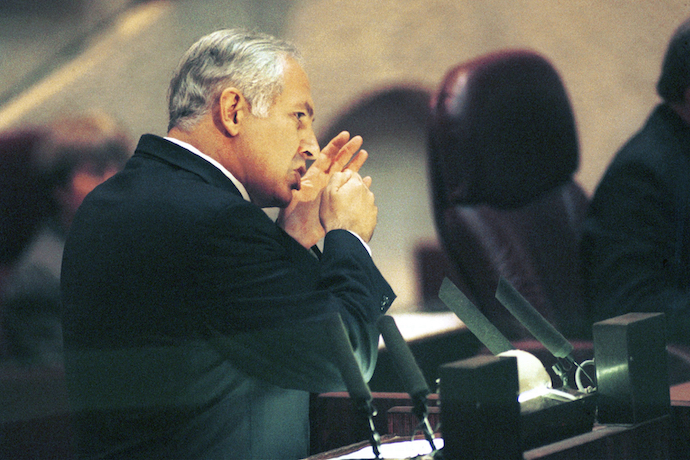
The Myths of Unattainable Mid-East Peace
Shortly after the unprecedented surprise attack by Hamas militants on October 7, which resulted in over 1,000 Israelis killed, U.S. Congresswoman Rashida Tlaib (D-MI) issued the following statement: “I grieve the Palestinian and Israeli lives lost yesterday, today, and every day. I am determined as ever to fight for a just future where everyone can live in peace, without fear, and with true freedom, equal rights, and human dignity.”
Tlaib’s sentiments were echoed by other progressive members of Congress, including Rep. Ilhan Omar (D-MN), who said, “The solution to this horror, as ever, is a negotiated peace — with Israelis and Palestinians enjoying equal rights and security guarantees.” Rep. Cori Bush (D-MO) remarked: “Violations of human rights do not justify more violations of human rights, and a military response will only exacerbate the suffering of Palestinians and Israelis alike.”
Based on official U.S. policy that has now been in place for decades, these comments should not be seen as controversial. They simply echo what’s been said by U.S. policymakers for years. The truth is, ordinary Palestinians and Israelis want to live peacefully, side-by-side.
And yet, there remains a growing and pernicious weed in the discourse, found in gardens on both sides of the political aisle, that seeks to wash its hands of the very concept of Mid-East peace and does so via a certainty that the endeavor is futile.
Essentially, it’s the flat-Earth theory of geopolitics.
This unsavory trend is rooted in a number of sub-myths, canards heard early and often these days in discussions of relations between Israel and its neighbors. Together, these canards form the basis of a dialectical umbrella myth.

Myth: ‘The Conflict is Too Old’
Anyone who has spent any time studying or discussing the Israel-Palestine relationship has heard this one: “That dispute has been going on forever. If it hasn’t been resolved after all this time, what’s the likelihood that it will ever be resolved?”
Like a lot of dialectical myths, this one is largely the product of disinformation. Hard-right supporters of Israel engage in the propaganda tactic of misleading the Western public as to the true age, origins, and context of the conflict.
Spanning from the dawn of the current era to the period governed by the British Mandate, the historical landscape of Palestine was marked by the coexistence of Arab and Jewish communities. Their proximity was not merely geographic; it often reflected a genuine semblance of harmony. Manifestly, the strife involving Israel and its Arab neighbors could not precede the formal existence of Israel. Consequently, the Israeli-Palestinian discord traces its inception to the same timeline as the establishment of the State of Israel, which is to say, it spans a period of 76 years.
That is living memory. There are people alive today who lived through the Nakba and who can’t help but recall every dark detail.
Myth: ‘The Situation is Too Complicated’
This canard receives bonus points for also being a logical fallacy. Even if it is true that the Israel-Palestine relationship is complicated, that would be neither probative nor persuasive on the matter of resolving the disputes that arise within it.
Almost everything in life is complicated if one digs deep enough into the issue at the heart. What matters is whether the will exists to parse all the finer points in good faith, pursuant to a resolution that actually is just and fair, as opposed to a mostly meaningless gesture, political stunt, or self-serving photo-op. This sub-myth is often used to justify endlessly kicking the can down the road with regard to actually resolving the conflict.
Yes, there’s a lot to resolve in the conflict between Palestinians and the State of Israel. Yet, the notion that that’s a reason to abandon all serious effort is a product of extreme laziness or active propagandizing on behalf of a status quo that truly only benefits one side or both.

Myth: ‘The Palestinians Won’t Compromise’
There are a number of origin points for this myth, but most of them stem from previous fiascos perpetrated during the so-called peace process. Chief among these was the Oslo Accords when negotiators from both sides met in secret to try to legitimately resolve issues of concrete importance to all. This was back in the early ‘90s, when the left held more sway in Israel than it has held since Benjamin Netanyahu came to power, and there was a genuine appetite for a peaceful resolution that had never existed in Israel before.
After those negotiations essentially fell apart, Netanyahu’s party, Likud, began to rise, bullying and silencing the left on its way to installing Netanyahu in 1996. Almost immediately, the narrative around the Oslo Accords began to spin a tale of all its failures being the Palestinians’ fault: “We offered them the moon, and they walked away from the table!”
This disinformation has been debunked repeatedly, not merely by Palestinians, but by the very negotiators who were part of the Israeli delegation. Those negotiators were given extremely demanding orders that effectively required that all disputed matters be resolved, even ones that the Palestinians had no authority to decide, such as the final status negotiations on Jerusalem. No single Arab leader can make deals on behalf of global Islam, and Israel knew it. Yet, it refused to allow any issues to be tabled for later, despite the fact that tabling problematic issues is standard practice in diplomacy.
Israel has violated numerous agreements it has reached not merely with the Palestinians, but even with third parties who tried to mediate between the two. Israel has refused to abide by the terms it agreed to in negotiations and embarrassed its partners in the process. The canard that it is the Palestinians who have refused good offer after good offer is simply not supported by the facts. And of course, it is beyond dispute that the Palestinians, being the occupied civilian population, have very little bargaining power.

The October 7 attacks by Hamas complicates any efforts to revive negotiations over a two-state solution, but the entire existence of Hamas is a direct by-product of Israel’s approach to the Gaza Strip, so eradicating Hamas, as the Netanyahu government has said it seeks to do, is not an act that will progress the peace process. Apologists for Israel are quick to assert that there will never be a Palestinian state while Hamas governs Gaza, but replacing Hamas with nothing but more illegal military occupation will only result in another Hamas arising to fill the void. Only by ending the occupation is peace possible.
The Palestinians did not choose this conflict, and given the conditions under which they are being forced to live, most would happily and gratefully see it ended. It is the ongoing occupation and oppression that is the largest, truest obstacle to peace. When Israel gets serious about ending the occupation, it will find the Palestinians willing partners in peace.
Myth: ‘It’s Too Late to Make it Right’
At some point in a rational discussion of Israel and Palestine, the average person will accept the premise that, based on historical fact, the Palestinians do have a pretty strong case for better treatment than they’ve gotten for the last 76 years.
What the otherwise rational person says next is what’s most telling. And more and more often, what they have to say is some variety of, “Okay, that definitely is awful, but it’s been decades at this point, and now there’s all these settlements. Surely, it’s too late to make it right.”
Fraught though the path may be, it’s not too late to attain a just and lasting peace between not merely Israel and the Palestinians, but between Israel and all its neighbor states. As noted above, the overwhelming majority of the Arab and Muslim world simply wants Israel to behave like a rational state actor.
It is within Israel’s capacity to increase its security by reducing the global resentment of Israel. If it chooses and truly commits to peace, Israel can have it. Those in power just have to be convinced to allow it to be.
Right now, the fact of the matter is that there’s very little incentive for Israel to change course to embark upon that path. And so long as its far-right government continues to receive near-boundless financial and political support from Washington, that state of affairs is unlikely to change.
The people can talk about peace, pray for peace, and reach for peace all they want, but until and unless the ruling class allows it, there will be no peace.

